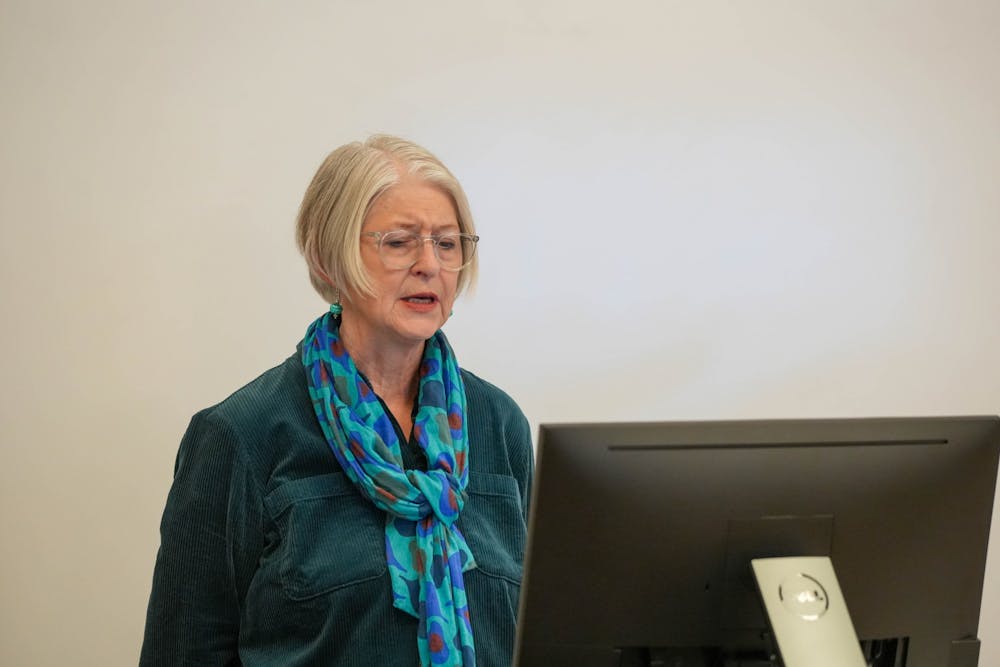The Diversity, Equity and Inclusion Committee of the Faculty Senate introduced a resolution to censure College and Darden alumnus Bert Ellis’s appointment to the Board of Visitors at its general body meeting Thursday. If passed, the resolution would act as an official statement disapproving Ellis's appointment to the Board. The Board also began voting on four proposed amendments and voted to table a fifth proposed amendment.
The censure was based on Ellis’s behavior during a visit to Grounds in September 2020. According to a personal statement written by Ellis about the visit, he “was prepared to use a small razor blade” to remove a controversial sign on a Lawn room door that used expletives to describe the University’s history of enslavement and inaccessibility.
Ellis has also recently drawn criticism from Student Council, University Democrats and Virginia Democrats for his role in bringing a eugenicist supporter to Grounds and for denying a co-sponsorship with the Gay Student Union in bringing a gay rights activist to the University.
Assoc. Art Prof. Eric Ramirez-Weaver, chair of the DEI committee, presented the resolution. Ramirez-Weaver said that the DEI Committee agrees with Student Council’s comments about Ellis.
“We find that Mr. Ellis is not representing our community with regard to safety, with regard to the very important and explicitly clear points in the mission statement of the University of Virginia to promote a vibrant and unique residential learning environment, marked by the free and collegial exchange of ideas,” Ramirez-Weaver said.
During the meeting, Law Prof. Rich Hynes said passing the resolution as written would be a mistake because there is not enough evidence about Ellis’s conduct referenced in the censure. He said if the behavior violated the weapons policy — which he did not think it did — then the focus should be on public safety, not the free exchange of ideas. SEC-030 prohibits the possession, storage and use of any weapon within the Academical Village, including the Lawn.
“The resolution doesn’t say that he actually vandalized the sign,” Hymes said. “It doesn’t actually even say any specific conduct that I think warrants a censure. If we pass this resolution, we’ll be opening ourselves to the criticism that the real motivation is that we object to Mr. Ellis’s political views.”
Nursing Prof. Kimberly Acquaviva said she felt Ellis’ conduct is unrelated to his political views.
“We cannot have a space in which people’s views are suppressed with someone yielding a razor blade,” Acquaviva said.
The Senators will vote on the resolution to censure Ellis online in the coming days. Along with the resolution, Senators will also vote on four proposed bylaw amendments, which were introduced at the Senate’s September meeting.
There were originally five amendments scheduled for a vote, but a motion passed 27-18 to table the fifth amendment, which proposes to change the election process of a Faculty Senate representative to the Board from a direct election to a slate of three representatives. The fifth amendment has spurred controversy among senators.
Assoc. Music Prof. Michelle Kisiluk said she raised the motion to table the fifth amendment because there was not sufficient time to debate the amendment. She requested a special Senate meeting to be called to further debate the amendment.
During the meeting, Assoc. Commerce Prof. Jeri Seidman motioned for the Faculty Senate to respond to the Board of Visitors’ request to provide a list of three potential representatives. The motion passed with 24 senators in favor, 23 against and 3 abstentions. Patricia Jennings, chair of the Faculty Senate and Education professor, said the motion was not an action and was completely non-binding.
For a motion to pass, it only needs the majority vote of senators present. For an amendment to the bylaws to pass, a minimum of 60 percent of the entire Senate needs to vote in favor.
Walt Heinecke, president of the University’s chapter of American Association of University Professors and associate professor of education, said he feels Seidman’s motion violates and contradicts the Senate’s current bylaws. He called the motion a political move as a way to circumvent the stricter voting processes which apply to proposed bylaw amendments.
In attendance at the meeting were about eight members from the United Campus Workers of Virginia — a wall to wall labor union, which means it includes all University faculty. They held signs that read “grad student and faculty solidarity,” and attended the meeting to encourage Senators to vote against the fifth proposed amendment.
The next hybrid Faculty Senate meeting will be held Nov. 18 from 1 to 3 p.m. in Monroe Hall room 124.







